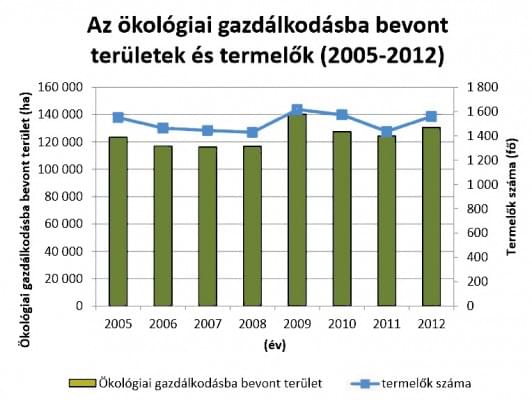Magazin: Ambitious plans in Hungary’s ecological farming
The National Action Plan for the Development of Ecological Farming is valid until 2020 and its main goals are to increase the size of land used for organic farming and to raise the number of livestock bred ecologically. Additional objectives include popularising organic food products and educating consumers about the benefits of ecological farming.
As a result of Hungary’s agricultural policy and subsidy system in the last few years, Hungary was the only member state of the European Union where the size of land used for ecological and organic farming stagnated and reduced. In 2010 Hungary used 133,000 hectares of land to produce organic goods in the value of HUF 20 billion, 80-85 percent of which are exported in raw material form. At the same time 90 percent of processed ecological products sold in Hungary come from abroad. The Ministry for Rural Development is determined to change this situation: with the help of the action plan mentioned above the size of land in organic farming is planned to grow to 350,000 hectares and 30 percent of ingredients used in public catering will have to be organic. Unfortunately most of the farmers are struggling with lack of capital and inadequate production infrastructure, and there is great administrative burden on them, too. However, it is a good thing that there are trade and interest representing organisations such as the Hungarian Bioculture Association, Biokontroll Hungária Kft., the Ecological Farmers in the Carpathian Basin Association, Hungária Öko Garancia Kft. or the Ecological Agriculture Institute. Consumer demand for organic products keeps growing and ecological farming fits into the government’s agricultural and other policies. The ministry expects the action plan to create new jobs because ecological farming requires more manual labour. Green farming can greatly contribute to the development of SMEs and strengthen both the local and the national market. Measures that will put the action plan into practice will bear fruit in the form of more ecological products, a higher level of processing and more efficient production control. Many aspects of farming will have to be analysed thoroughly before implementing the programme, from land use to production capacities to the location of abattoirs to the possible subsidising of organic livestock farming, beekeeping, mushroom cultivation and fish farming. In the 2014-2020 period more regional development funding from the European Union is planned to be channelled into ecological farming in Hungary. What is more, in the government’s new rural development programme ecological farming is included as a separate theme.
Related news
Related news
The Hungarian Food Book is 50 years old
🎧 Hallgasd a cikket: Lejátszás Szünet Folytatás Leállítás Nyelv: Auto…
Read more >ZEW: Economic expectations worsened in Germany and the euro area in February
🎧 Hallgasd a cikket: Lejátszás Szünet Folytatás Leállítás Nyelv: Auto…
Read more >NKFH: inspections focus on discount prices and customer deception
🎧 Hallgasd a cikket: Lejátszás Szünet Folytatás Leállítás Nyelv: Auto…
Read more >






